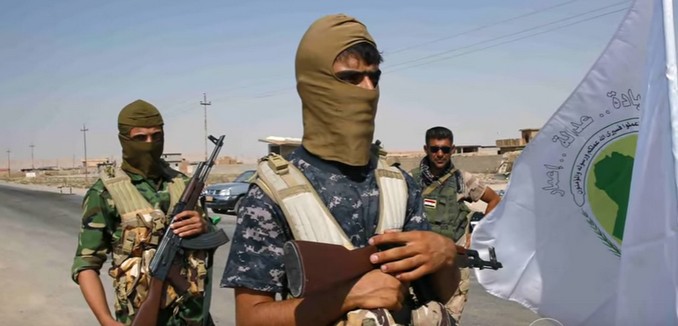One of the most effective Iraqi Shiite militias has captured a town on the Syria border, drawing Iran’s “Shiite crescent” closer to Israel, Seth Frantzman reported for The Jerusalem Post on Tuesday.
The Badr Brigade has reached the Iraqi village of Um Jaris, meaning that “forces that are close to Tehran pose a risk of linking up through Syria” and threatening Israel.
The Badr Brigade is “one of the best organized and most veteran Iran-supported Shi’ite militias” or Popular Mobilization Forces (PMF) in Iraq, according to Jonathan Spyer, director of the Rubin Center for Research in International Affairs. Hadi al-Amiri, the commander of the Badr Brigade, is close to Maj. Gen. Qassem Soleimani, head of Iran’s Islamic Revolutionary Guard Corps’ elite Quds Force. It is an “effective and well-organized military unit with armored vehicles and artillery,” Spyer said.
Iran now has the means to project its influence from Baghdad to the Syrian border. Analyses and reports cited by Frantzman note that this is “part of a wider {Iranian] strategy to construct a corridor” to the Mediterranean Sea.
“The next move that can be expected from the Shi’ite militias is to strike south along the Iraqi border and clear ISIS toward Qaim and Al-Bukamal, which could link them up with Syrian regime forces moving east from Damascus,” Frantzman wrote. However, there are some U.S.-backed rebel groups in the region that could oppose such an effort.
If the Badr Brigade or other PMF units start operating inside Syria, it could pose an increased threat to Israel, “because Hezbollah is present in Syria and uses Syria as a corridor for weapons transfers,” Frantzman observed.
“Shiite militias controlled by Iran now play a far greater role than in 2011,” The Wall Street Journal reported last September, a month after Iraq expelled its Saudi ambassador after he criticized the Iran-backed groups. The militias were integrated into the Iraqi army last year and have taken over numerous Sunni areas from ISIS.
Andrew Tabler, a fellow at the Washington Institute for Near East Policy, told the Journal that “Iran’s power has spread further afield than before in terms of direct military power. We have never had so many Shiite militias operating in so many different areas, and fighting in traditional Sunni strongholds.”
Analysts have warned that the threat posed by Shiite militias could lead to a new insurgency in the region. Saleh al-Mutlaq, a Sunni and former Iraqi deputy prime minister, told the Journal that the ongoing disenfranchisement of Sunnis could lead to a repeat of history. “Unless you start thinking about the conditions that created ISIS in the first place and try to overcome these conditions,” he said, “there will be a new ISIS again, maybe of a different kind.”
Iran’s formation of a Shiite “Liberation Army” last year has raised fears among observers that Tehran “is asserting itself as a regional or even an imperialistic power,” according to Tallha Abdulrazaq, a researcher at the University of Exeter.
Reuters reported in August 2016 that Washington has failed to rein in the PMF operating in Iraq, even as they “detained, tortured and abused” hundreds of Sunni civilians. In Syria, forces backed by Iran have ethnically cleansed several Sunni neighborhoods in and around Damascus.
[Photo: CBS Evening News / YouTube ]




